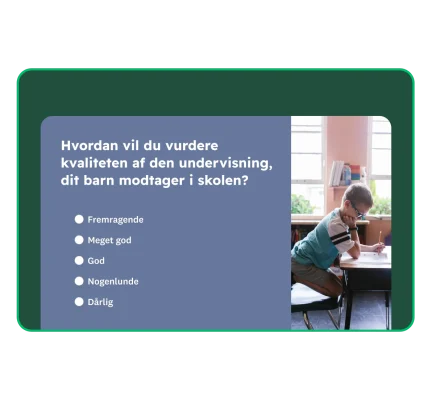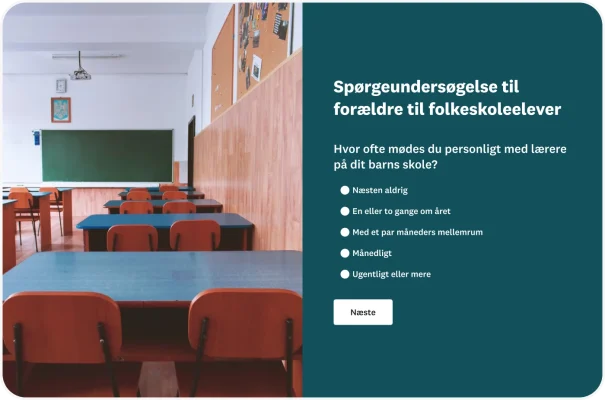Over 50 effektive spørgsmål og skabeloner til spørgeundersøgelser til forældre til konstruktiv feedback
SurveyMonkey og Harvard Graduate School of Educations samarbejder for at hjælpe skoler med at forbedre forældreinddragelsen

Forældre verden over vil gerne være mere involverede i deres børns læring, og skoler, der lytter til forældrene, er bedre rustet til at opfylde disse forventninger, ifølge Varkey Foundations globale spørgeundersøgelse til forældre.
Spørgeundersøgelser til forældre hjælper ikke kun underviserne med at træffe informerede beslutninger, men giver også forældrene en stemme i forbindelse med deres børns uddannelse. Spørgeundersøgelser til forældre indsamler værdifuld feedback, som kan forbedre kommunikationen, skabe engagement og i sidste ende understøtte bedre elevresultater.
I denne artikel får du adgang til over 50 spørgsmål til forældre og ekspertforfattede skabeloner til spørgeundersøgelser, der kan engagere forældrene og forbedre elevernes resultater.
Hvad er en spørgeundersøgelse til forældre?
En spørgeundersøgelse til forældre er et værktøj, som bruges af skoleadministratorer og undervisere til at indsamle feedback fra forældrene om deres børns uddannelse.
En spørgeundersøgelse til forældre indeholder typisk spørgsmål omkring skolens miljø, den faglige opbakning, kommunikationen med lærerne og den generelle tilfredshed med skoleoplevelsen. Ved at give forældre en mulighed for at dele deres synspunkter kan skolerne indsamle direkte input fra en af de mest indflydelsesrige interessenter i en elevs uddannelse.
Dr. Karen Mapps artikel fra 2002, "A New Wave of Evidence", fremhæver, at forældreinddragelse booster elevernes akademiske præstationer, standardiserede testresultater, sociale kompetencer og dimissionsprocenter.
Spørgeundersøgelser til forældre er afgørende for at forstå, hvad forældrene har brug for, hvilke betænkeligheder de har, og hvordan skolerne bedre kan understøtte elevernes læring og succes. Skolerne kan bruge disse oplysninger til
- at evaluere deres programmer
- at forbedre kommunikationsstrategier
- at udvikle et mere inkluderende og støttende undervisningsmiljø.
Leder du efter et brugervenligt værktøj til at komme i gang?
Brug vores skabelon til spørgeundersøgelser om forældres engagement til at indsamle feedback fra forældre og forbedre elevernes resultater.
Over 50 spørgsmål til en spørgeundersøgelse til forældre
For at sikre at forældrenes engagement har en positiv indvirkning på uddannelsen, har vi indgået et samarbejde med Dr. Hunter Gehlbach fra Harvard Graduate School of Education om at hjælpe grundskolerne skolegang med at stille de rigtige spørgsmål.
Vores partner Dr. Gehlbach og hans team anvendte en omhyggelig proces til at udvikle spørgsmål, der vurderer hovedområderne i forholdet mellem familie og skole. Med udgangspunkt i akademisk litteratur, forældreinterviews, fokusgrupper, ekspertpaneler og bedste praksis til design af spørgeundersøgelser udviklede teamet denne skabelon til spørgeundersøgelser til forældre med følgende hovedområder.
Her er de over 50 spørgsmål til din næste spørgeundersøgelse til forældre.
Skolekommunikation
- Hvor ofte modtager du kommunikation fra skolen?
- Hvad er din foretrukne kommunikationsform fra skolen?
- Hvilke typer oplysninger synes du er mest nyttige? Vælg alle relevante.
- Hvor tilfreds er du med det nuværende kommunikationsniveau fra skolen?
- Synes du, at kommunikationen fra skolen kommer rettidigt?
- Hvor tydelige er oplysningerne fra skolen?
- Hvilke eventuelle barrierer møder du i kommunikationen fra skolen? Vælg alle relevante.
- Hvilke forslag har du til at forbedre kommunikationen fra skolen?
- Hvor godt synes du, at skolen håndterer dine spørgsmål og betænkeligheder?
Pensum og læring
- Hvor tilfreds er du med det nuværende pensum, som skolen tilbyder?
- Synes du, at pensum opfylder dit barns uddannelsesmæssige behov?
- Hvilke emner synes du, burde have mere fokus i pensum?
- Hvordan vil du vurdere den samlede kvalitet af undervisningen på skolen?
- Hvor godt synes du, at skolen forbereder eleverne til fremtidige akademiske resultater?
- Hvad synes du, at styrkerne er ved det nuværende pensum?
- Hvordan kan pensum blive bedre?
- Hvor ofte modtager du opdateringer om dit barns fremskridt?
- Synes du, at skolen tilbyder tilstrækkelige ressourcer og støtte til dit barns læring?
- Hvor involveret føler du dig i dit barns uddannelse?
Skolemiljø og sikkerhed
- Hvordan vil du vurdere det overordnede miljø på skolen?
- Hvor tilfreds er du med sikkerhedsforanstaltningerne på skolen?
- Hvilke sikkerhedsforanstaltninger mener du er mest effektive på skolen? Vælg alle relevante.
- Hvor imødekommende synes du, at skolens personale er med hensyn til sikkerhed?
- Hvordan vil du vurdere kommunikationen fra skolen vedrørende sikkerhedspolitikker og hændelser?
- Hvor tryg mener du, at dit barn er i skolen?
- Hvor tilfreds er du med skolens indsats mod mobning?
- Hvor godt synes du, at skolen håndterer psykiske udfordringer?
- Hvilke forslag har du til at forbedre skolemiljøet og sikkerheden?
Forældres engagement
- Hvor ofte kommunikerer du med dit barns lærere?
- Hvilke af følgende skolearrangementer deltager du typisk i? Vælg alle relevante.
- Hvor ofte hjælper du dit barn med lektier?
- Hvor involveret føler du dig i dit barns uddannelse?
- Hvor vigtig synes du, at forældreinddragelse er for et barns akademiske succes?
- Synes du, at skolen giver tilstrækkelige muligheder for forældreinddragelse?
- Hvor mange timer om ugen bruger du på skolerelaterede aktiviteter med dit barn?
- Hvor godt tilpas føler du dig ved at kommunikere med dit barns lærere?
- Hvor ofte deltager du i skoleudvalg eller forældreorganisationer?
Støttemuligheder til elever
- Hvor tilfreds er du med den overordnede elevstøtte som skolen yder?
- Hvilken elevstøtte har dit barn benyttet? Vælg alle relevante.
- Hvor effektive mener du, at rådgivningstjenesterne er til at understøtte dit barns følelsesmæssige og mentale velbefindende?
- Hvor tilgængelig er den lektiehjælp, som skolen tilbyder?
- Hvor tilfreds er du med det specialundervisningstilbud, som skolen tilbyder?
- Hvor sandsynligt er det, at du vil anbefale skolens forskellige elevstøttemuligheder til andre forældre?
Læreres og personales præstation
- Hvor tilfreds er du samlet set med lærernes præstation på vores skole?
- Hvor effektive er lærerne til at håndtere dit barns akademiske behov?
- Hvordan vil du vurdere støttemedarbejdernes lydhørhed over for dine betænkeligheder?
- Hvor imødekommende og hjælpsomme er skolens ledelse?
- Hvilke aspekter af lærerindsatsen synes du er mest tilfredsstillende? Vælg alle relevante.
- Hvor tilfreds er du med skolens indsats for at sikre trygge og rummelige rammer for alle elever?
Generel tilfredshed
- Hvor tilfreds er du med den generelle kvalitet af den undervisning, der tilbydes?
- Hvordan vil du vurdere kommunikationen mellem skolen og forældrene?
- Hvor tilfreds er du med skolens faciliteter og ressourcer?
- Hvor tilfreds er du med de fritidsaktiviteter, der tilbydes?
- Hvordan vil du vurdere kvaliteten af lærergruppen?
- Hvor tilfreds er du med skolens håndtering af mobning?
- Hvad, synes du, er skolens største styrke?
- Hvilket område, synes du, har brug for mest forbedring?
Planlægning af fremtiden og forventninger
- Hvad er din primære betænkelighed vedrørende dit barns fremtid? Vælg alle relevante.
- Hvor vigtigt er det for dit barn at få en videregående uddannelse?
- Hvilken type videregående uddannelse foretrækker du til dit barn?
- Hvad er dine forventninger til dit barns karrierevej?
- Hvor sikker er du på dit barns evne til at nå sine fremtidige mål?
- Hvilke færdigheder, synes du, er vigtigst for dit barn at udvikle for at få succes i fremtiden? Vælg alle relevante.
- Hvor involveret regner du med at være i planlægningen af dit barns videre uddannelse?
- Hvor sandsynligt er det, at du vil søge professionel vejledning til planlægningen af dit barns fremtid?
Relateret: De mest populære spørgsmål i spørgeundersøgelser til elever
Skabeloner til spørgeundersøgelse til forældre
Rektorer, distriktspersonale, skolebestyrelser eller forældre-/lærerorganisationer fra alle grundskoler – offentlige, private, uafhængige, frie, i byen eller på landet – kan bruge spørgeundersøgelser til forældre til at undersøge forholdet til forældrene.
Det kan også give dig brugbar kontekst at sammenligne resultatet af dine spørgeundersøgelser med andre skolers eller organisationers resultater. At finde et benchmark til at sammenligne dine data om forældrenes engagement kan hjælpe dig med at sætte handlingsrettede mål og bedre forstå dine styrker i interaktionen mellem skole og forældre.
Spørgeundersøgelse om forældrenes engagement

En spørgeundersøgelse om forældres engagement er ideel til at vurdere, hvor involverede forældre føler sig i deres barns skolegang. Den hjælper skoler med at finde ud af, hvor effektivt de kommunikerer, og hvor der kan være muligheder for at øge forældrenes engagement. Brug skabelonen til spørgeundersøgelser om forældres engagement til at identificere områder, hvor forældre føler sig mest engagerede – og hvor de gerne vil spille en mere aktiv rolle.
Spørgeskema om forældrestøtte
Skabelonen til spørgeundersøgelse om forældrestøtte er udviklet til at undersøge, hvilken slags støtte forældrene har brug for fra skolen og afdække, hvilke ressourcer eller hvilken hjælp familien har brug for til at støtte deres barns læring på en bedre måde. Den indeholder spørgsmål om akademisk vejledning, støtte uden for skolen og meget mere.
Spørgeundersøgelse til forældre til grundskoleelever

Denne universalundersøgelse er specielt udviklet til familier med børn i grundskolen. Skabelonen til spørgeundersøgelse til forældre med børn i grundskolen indsamler feedback på skolens programmer, lærerkommunikation og den generelle tilfredshed og giver et godt billede af forældrenes oplevelse.
Spørgeundersøgelse om børns adfærd
Spørgeundersøgelsen om børns adfærd fokuserer på, hvordan forældre observerer deres barns adfærd både hjemme og i skolen. Skabelonen til spørgeundersøgelse om børns adfærd er et værdifuldt værktøj til at identificere adfærdsproblemer og opbygge et samarbejde mellem familier og lærere for at håndtere disse udfordringer.
Spørgeundersøgelse om forældrenes egne evner
Denne spørgeundersøgelse hjælper skolerne med at vurdere, hvor sikre forældrene føler sig på at kunne støtte deres barns akademiske udvikling. Skabelonen til spørgeundersøgelse om forældres egne evner er især nyttig til at identificere, hvor forældre måske har brug for yderligere ressourcer, uddannelse eller vejledning.
Spørgeundersøgelse om egnethed til skoleprogram
En spørgeundersøgelse om egnethed til skoleprogram vurderer, hvor godt skolens programmer stemmer overens med forældrenes forventninger og elevernes behov. Skabelonen til spørgeundersøgelse om egnethed til skoleprogram er et praktisk værktøj til at identificere mangler i programmet og input til forbedringer.
Spørgeundersøgelse om forældres roller og ansvar

En spørgeundersøgelse om forældres roller og ansvar undersøger, hvordan forældre opfatter deres rolle i deres barns uddannelse. Skabelonen til spørgeundersøgelse om forældres roller og ansvar hjælper skolerne med bedre at kunne definere forældre-lærer-samarbejdet og tydeliggøre forventningerne fra begge sider.
Sådan opretter du en spørgeundersøgelse til forældre
En veltilrettelagt spørgeundersøgelse kan give værdifuld feedback på alt fra skolens kommunikation til faglig støtte. Men en uhensigtsmæssig designet spørgeundersøgelse vil føre til lave besvarelsesprocenter, uklare data og forpassede muligheder for at forstå forældrenes perspektiver.
Vejledningen herunder guider dig gennem processen for at sikre, at din spørgeundersøgelse er fokuseret, effektiv og nem at udfylde for forældrene.
Definer dine mål
Inden du overvejer spørgsmål eller spørgeundersøgelsesdesign, skal du beslutte, hvad du vil have ud af spørgeundersøgelsen. Se det som den første fase i et gennemarbejdet researcharbejde – det er dit analysespørgsmål.
Ønsker du feedback på skolens kommunikation, akademiske programmer eller forældreinddragelse? Når du har klart definerede mål, er det en hjælp til at formulere fokuserede spørgsmål, som genererer handlingsrettet indsigt.
Vælg det rigtige spørgeundersøgelsesværktøj
En effektiv platform er alfa og omega. Vi anbefaler, at du bruger en pålidelig platform til at designe og distribuere din spørgeundersøgelse – en platform, der tager vigtigheden af din spørgeundersøgelse seriøst.
SurveyMonkey tilbyder brugervenlige værktøjer, som kan hjælpe dig med at oprette, sende og analysere spørgeundersøgelser sammen med ekspertforfattede skabeloner til forældre, udviklet specifikt til skoler. Brug vores AI-drevne spørgeundersøgelsesværktøj til at oprette og analysere spørgeundersøgelsesresultater som en ekspert.
Skriv klare, relevante spørgsmål
Overvej en essay-struktur med fem afsnit: Begynd med en tese efterfulgt af tre understøttende afsnit og afslut med et sammendrag. Nøglen til et godt essay ligger i at understøtte afsnit, som er klare, relevante og effektivt underbygger det argument, som præsenteres i din tese.
Det, der gør spørgeundersøgelser til forældre succesrige, er undersøgelser, der er afstemt med dit analysemål. Hold dine spørgsmål enkle, specifikke og målrettede. Brug en blanding af multiple choice, vurderingsskala og åbne spørgsmål til at indhente både kvantitativ og kvalitativ feedback.
Derudover skal du tage din målgruppe i betragtning, når du udformer spørgsmålene til din spørgeundersøgelse. Undgå ledende spørgsmål eller for komplekse formuleringer, der kan føre til bias i undersøgelsen eller at spørgeundersøgelsen helt droppes.
Test din spørgeundersøgelse
Inden spørgeundersøgelsen distribueres til hele forældregruppen, anbefaler vi at lave en indledende test i en lille repræsentativ gruppe.
En sådan pilotfase kan svare til en peereview i klasseværelset. Den giver dig mulighed for at identificere uklarheder og sikre, at sproget er kort, klart, præcist og forståeligt for alle respondenter.
Desuden hjælper en test med at afdække potentielle udfordringer med brugervenligheden, som forvirrende navigation eller tekniske fejl. Det vil sikre, at forældrene får en nem og ubesværet brugeroplevelse.
Denne indledende feedbacksløjfe er uvurderlig til at videreudvikle spørgeundersøgelsen, forbedre den samlede effektivitet og maksimere kvaliteten og pålideligheden af de data, der indsamles fra den bredere forældregruppe.
Distribuer spørgeundersøgelsen
Del spørgeundersøgelsen via kanaler, som forældrene bruger regelmæssigt.
Hvis du for eksempel regelmæssigt sender en frokostkalender eller anden relevant kommunikation til forældrenes mail, kan det være en god måde at omdele en spørgeundersøgelse på, da forældrene er vant til kommunikation fra skolen ad denne vej. Lærerne kan også indlejre en spørgeundersøgelse på skolens website eller platforme som Aula.
Kommuniker målet med spørgeundersøgelsen og vigtigheden tydeligt for at opfordre til deltagelse.
Analysér resultaterne, og tag action, hvor det er nødvendigt.
Det er meget vigtigt at handle, når du har modtaget feedback på spørgeundersøgelsen. Gennemse alle data for at identificere tendenser, udfordringer og muligheder for forbedring.
Du vil måske opleve et stigende antal forældre, der ønsker information om lektiehjælpsprogrammerne. Eller forældre, der ikke ved, hvordan de skal hjælpe deres barn med skolearbejdet derhjemme.
Brug denne indsigt til at opdatere læseplanen og skolens programmer. Og husk at kommunikere alle planlagte tiltag, baseret på den feedback, du har fået. De fleste familier vil gerne orienteres om ændringer i deres barns læringsmiljø og forstå, hvordan de bedst kan hjælpe deres barn gennem disse overgange.
Relateret: Benchmarking af skolens præstation
Tip til gennemførelse af spørgeundersøgelse til forældre
En effektiv gennemførelse af spørgeundersøgelse til forældre handler om meget mere end at udsende en liste med spørgsmål. Hvis du vil indsamle konstruktiv feedback, skal du lægge en god plan, kommunikere tydeligt og skabe et miljø, der fremmer ærlige besvarelser.
Følgende tips kan hjælpe dig med at øge deltagelsen, forbedre besvarelseskvaliteten og maksimere den indsigt, du indsamler.
Inkluder demografiske oplysninger
Indsaml data om forældrenes baggrund, herunder deres barns klassetrin, husstandsindkomst og uddannelsesniveau for at identificere tendenser. Når du inkluderer demografiske spørgsmål til forældrene kan det hjælpe dig med at skræddersy programmer, forbedre kommunikationen og forbedre engagementsstrategier.
Gør dine spørgsmål klare og præcise
Formuler klare og handlingsrettede spørgsmål, som går i dybden med relevante aspekter af skoleoplevelsen. Undersøgelsen bør indeholde spørgsmål om kommunikation, støtte og det overordnede læringsmiljø.
Sørg for, at hvert spørgsmål lægger op til refleksion og dækker aspekter som elevengagement, ressourcer til mental sundhed, sikkerhedsforanstaltninger og forældreinddragelse, hvilket fremmer en helhedsforståelse af uddannelsesrejsen.
Tilbyd både multiple choice og åbne spørgsmål
Kvantitative data fortæller kun halvdelen af historien. Forestil dig at få feedback, der siger, at de fleste forældre synes, at lektiehjælpsmuligheder er utilgængelige. Hvorfor? Et åbent spørgsmål kan give svar på, hvorfor forældre ikke kan få adgang til lektiehjælp til deres barn.
Et multiple choice-spørgsmål kan for eksempel være: "Hvor tilgængelige er de lektiehjælpstilbud, som skolen tilbyder?" Det opfølgende åbne spørgsmål lyder måske: ”Fortæl os om din oplevelse med at få adgang til lektiehjælpsmuligheder”.
Måske vil du opleve, at forældrene ikke ved, hvordan de skal tilmelde deres barn til lektiehjælp, eller de ønsker måske, at tidspunkterne for lektiehjælp bliver udvidet.
Del resultaterne, og forklar, hvordan du vil bruge den feedback, du har fået.
Når alt kommer til alt, er uddannelse et samarbejde, der ofte bliver sammenlignet med en holdsport, hvor lærere, forældre og elever samarbejder om at opnå de bedste uddannelsesmæssige resultater.
Det er også vigtigt at præsentere resultaterne af spørgeundersøgelsen for forældrene på en tydelig og tilgængelig måde. Denne gennemsigtighed hjælper forældre med at forstå det aktuelle klassemiljø, eventuelle kommende ændringer i pensum eller undervisningsmetoder samt specifikke strategier, de kan anvende for at understøtte deres barns læringsrejse.
Ved at holde forældrene informerede og engagerede kan du skabe et stærkere samarbejde, der gør eleverne bedre og skolens overordnede samfundsengagement større.
Sørg for, at spørgeundersøgelsen er anonym for at opfordre til mere ærlige svar
Det er vigtigt at huske, at nogle forældre kan være nervøse for at komme med ærlig feedback på grund af bekymringer om eventuel gengældelse mod deres barn. Denne frygt kan stamme fra tidligere oplevelser, misforstået magtdynamik eller manglende tillid til systemet. For at imødekomme disse bekymringer og tilskynde til åben kommunikation er det afgørende at forsikre forældrene om, at deres input modtages anonymt.
Anonyme spørgeundersøgelser sikrer, at personlige identifikatorer ikke bliver indsamlet eller knyttet til besvarelser. Ved at understrege anonymitet og kommunikere, hvordan besvarelserne vil blive brugt til at forbedre skolemiljøet, kan forældre føle sig mere trygge ved at dele deres tanker uden at være nervøse for, at det får negative konsekvenser for deres børn.
Relateret: Øg skolens engagement med elevafstemninger
Opret dine spørgeundersøgelser med SurveyMonkey
Det behøver ikke være kompliceret at oprette konstruktive spørgeundersøgelser til forældre og værger. Med vores skabeloner, der er udviklet af eksperter, kan skoleadministratorer hurtigt oprette spørgeundersøgelser til forældre – med spørgsmål, der hjælper med at afstemme faglige mål, øge trivslen i klasseværelset og skabe en følelse af kammeratskab mellem lærere og forældre.
Vores værktøjer gør det nemt at indsamle feedback, analysere resultaterne og skabe positive ændringer i miljøet på skolen. Er du klar til at gå i gang? Udforsk SurveyMonkey til uddannelse for at oprette effektive spørgeundersøgelser, der understøtter elevernes succes.
Se, hvordan SurveyMonkey kan vække din nysgerrighed
Se flere ressourcer

Løsninger til dit job
SurveyMonkey kan hjælpe med at gøre det bedre. Se, hvordan du får større indflydelse med vindende strategier, produkter, oplevelser og meget mere.

Få feedback, du kan handle på, med online evalueringsformularer
Opret og tilpas online evalueringsformularer. Indsaml struktureret feedback, evaluer præstation og tag nemt databaserede beslutninger.

Skabelon til tilmeldingsformular til børnepasning
Gør tilmeldingsprocessen enklere med vores formular om børnepasningstilbud. Tilpas den med SurveyMonkeys intuitive designværktøj til formularer.

Skabelon til registreringsformular til alumner
Hold kontakten med din institutions tidligere elever og studerende med vores skabelon til registreringsformular til alumner. Tilpas den til dit behov med vores intuitive designværktøj.